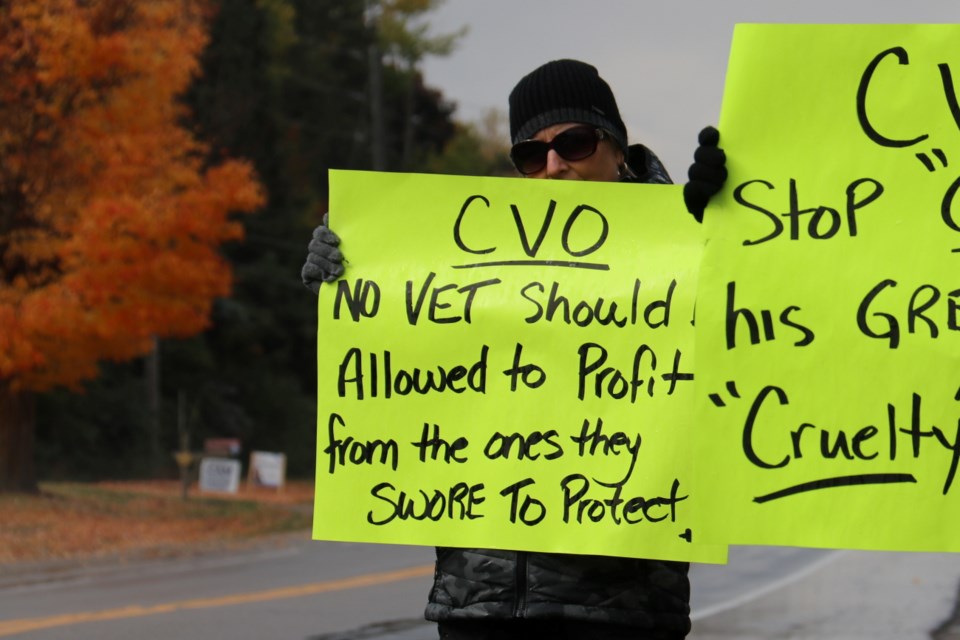A handful of protesters weathered the pouring rain and hail Monday afternoon to raise awareness about puppy mills in the area and pressure The College of Veterinarians of Ontario to take action against vets involved with unethical breeders.
“We’re the voice of the voiceless,” said Donna Power, who founded the group responsible for the demonstration, Ontario Puppy Mills - Stop This Now. Founded earlier this year, the group has around 350 members across the province.
“The puppies, they can’t ask for help. No one is going to help them if we don’t step up,” she said.
For the past nine months the organization has been advocating in areas like Wellington, Dufferin, Perth County, Huron, Grey-Bruce and the Region of Waterloo – a collection of places she called “puppy mill central.”
Mount Forest in particular is "a very high density puppy mill area" according to Power. "It’s also a transportation hub to ship dogs to brokers around the province.”
“It’s amazing to see people take action,” said Marissa Rowles, who was moved to tears by the protest. “It means so much to me to connect with people who actually stand up for what needs to change.”
The issue is a personal one for Rowles, who purchased a dog from a puppy mill in August.
“I was looking for a real breeder,” she said, and was browsing on Kijiji for a dog similar to the one she already had, when she noticed something off about one of the listings for a five-month-old puppy.
“The price was a huge red flag to me, because it started dropping,” she said, from $1,000 down to $800, and eventually $500.
Power calls this “dog dumping,” and said it was a result of the pandemic. Puppy mills went into overdrive during COVID-19 as the demand soared.
“An ethical breeder would normally have a waitlist of a year to two years, especially during COVID-19,” she said. “No one was going to wait two years for a puppy.”
But that demand has since waned. Struggling to get rid of them all for a decent profit, they’re selling them for much, much less.
As the listing went down in price, Rowles feared the dog would be put down, so she stepped in, not wanting to support the mill, but not wanting to let the worst happen.
She found her puppy, Conrad the Pomeranian, to be unvaccinated and riddled with ticks, mites and fleas. He also has a myriad of behavioural issues to contend with, including being afraid of men and not wanting to be touched.
But Conrad was one of the lucky ones. Power said it’s becoming more common for people to buy from these breeders, with the health passports stamped by the vet, only to see their puppy become “desperately ill” within days.
“We have a significant number of puppies who have been diagnosed with parvo and have died,” she said – a virus that is preventable if the puppy receives proper vaccines at the right time.
Puppy mills can be hard to identify, though, especially because they often avoid public dealings by selling directly to brokers, who might buy one litter and resell it out of their home.
“They don’t tell people they come from a puppy mill. They say, ‘oh, my dog had a surprise litter,’” and will turn a profit by selling them for more than they purchased them for.
Monday’s demonstration focused on a Brampton veterinarian who runs a mobile practice, and who, the group claims, services many of the puppy mills in the aforementioned areas.
“Under oath, they are supposed to report any abusive, neglectful situation,” Power said. “He’s negating his oath. Because when he goes into a puppy mill, right then and there, he should be reporting. He’s not, because he’s making money, getting paid cash to give them vaccination certificates.”
The CVO has been conducting an internal investigation into said vet, after receiving a complaint in February 2021, according to College Registrar and CEO Jan Robinson.
If it’s deemed by the complaint committee that there is enough evidence, a public hearing will follow.
Power said the group ideally wants the vet in question to have his license revoked, but to at least be suspended.
